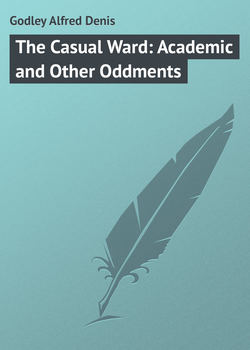Читать книгу The Casual Ward: Academic and Other Oddments - Godley Alfred Denis - Страница 5
HERODOTUS ON HORSEBACK
ОглавлениеAt this time the Chancellor being among the Oxonii there was instituted a contest of horses such as this nation is accustomed to celebrate every spring. And this contest is of such a kind, not being well arranged according at least to my opinion: – Having dug trenches and built other ramparts parallel indeed to each other but transversely to the running of the horses themselves, they do not any longer stand round them invoking the gods as those do who play golf, but on the contrary, when they have placed men upon horses they cause them to cross these by leaping under the lash, as far as the goal: and whoever anticipates the others arriving at the goal, sitting at least on the same horse on which sitting he set out, and not it running, having left him behind, nor he himself on foot, he is considered to have conquered. The reason why I said that this contest is not well arranged, is of the following kind: because it being possible to contend in a level place without danger or difficulty, the Oxonii nevertheless themselves make obstacles so as to prevent the horses from (not) arriving at the end of the course, neither being compelled nor there being any necessity (οὐδεμίης ἀναγκαίης ἐούσης). Then, however, they did these things, and also, as they are accustomed to do on such occasions, they sent messengers to inquire of other prophets and also of the Delphic oracle who should be the conqueror. The Pythian priestess, being mindful how she had formerly made a good shot in respect of the Median business, replied in the hexameter rhythm that the issues of victory lay around a wooden wall. Now having this as a proof I will neither refuse to believe in oracles myself nor allow others to disbelieve them. For when the race had begun and the horses had been sent away by the sound of a trumpet, other men were taking part in the contest, and also Pheron the son of Trapezites a Corinthian: this is not the Pheron who, his father having founded a city, was himself expelled from it by the few, who were called Hetairi, because he had allied himself with the democracy forsooth (δηθεν). And there are other things written about this Pheron in the history composed by Proctor, who was tyrant of Oxonia second himself for one year, and in fact caused Pheron to fall out by reason of sedition. What I have said just now is a digression and refers to other matters, and I will now come back to my former story. So then the men, having in the first part of the contest done things worthy of themselves, and having for the most part, although not all, yet the majority, avoided the (not) falling into ditches and the like incurably at least, came presently to the wooden fence, which I conjecture to be the wall meant by the Delphic oracle. It being then necessary either remaining on the hither side to be driven away from all hope of the prize or leaping to run risks concerning their lives, and the rest having leapt in such a way that they crossed the fence sitting rather upon the ground than upon their horses, and some neither with them nor upon them, as the Lacedæmonians say about their shields: this Pheron, of whom I have before made mention, showed himself to be prudent in other things and also in this. He, having a horse much the most active of all the rest, was not left behind by it, but sat there holding on firmly until he had arrived at the farther side; and from thence, the race being easy for him, he came to the goal very much the first, having anticipated. In this way he obtained the prize. I have learnt the names of all the other competitors: but I do not think it proper to relate them, not now at least.
When the spectators had seen these things (and there was also a contest for the natives of the country, in which not a few were roughly handled) they returned in chariots to the city, driving not straight like the Greeks, but obliquely, as is customary. This story some relate, relating things credible to me at least; there being two Oxonii in one chariot, and no one else, one of them entreated the other after they had gone some way without misfortune that he also might be allowed to hold the reins of the horses: to whom the other replied “But – for do you not already hold them?” These men then having left such a memorial of themselves did nevertheless arrive safely at the city.
